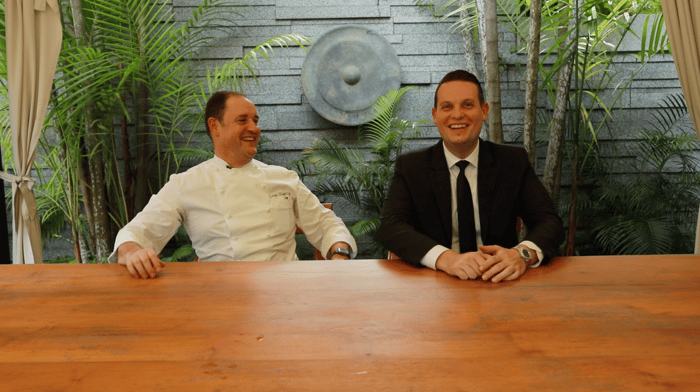Making the world grander, more inclusive, and more sustainable:
An interview with Grand Hyatt Singapore’s Sustainability Champions
Hospitality is a fine balance between delivering on luxury and amazing your customers with the most novel options around. As the planet heats up, we’re finding that a company’s best-seller is becoming their sustainability and impact.
Grand Hyatt Singapore’s commitment to sustainability is clear in their pushes to put plant-based food on their menus, source local and organic, and eliminate single-use plastics from their operations. In this exclusive interview, abillionveg hears directly from the Grand Hyatt Singapore’s Executive Chef Lucas Glanville and Food & Beverage Operations director Sebastian Kern on how one of the biggest players in hospitality is leading by purpose, example, and collaboration.

Chef Lucas and Sebastian sharing the Hyatt’s sustainability story. Image: abillionveg
abillionveg: Grand Hyatt Singapore has made various strides to really bring sustainability into the core of its operations. Can you tell us about your journey in sustainability and the impact you’re creating?
Chef Lucas: I think our journey in sustainability really began in 2010. These sustainable initiatives are something that add value to our business and give our guests a better experience. Hospitality is a very subjective business - all hotels say they have the best food, the best hotel, but once you go past that, you see it’s subjective.
So we felt sustainability is something that comes from the heart and from our associates who are working here. The plant-based initiatives that we’re implementing at the moment are just one of them. I’m talking about reduction in single-use plastics in the hotel and the great success we’ve had as one of the first hotels in Singapore with sustainable seafood.
Sebastian: We really look to improve sustainability measures, starting with the straws that we utilize. For instance; Do we have to offer them? Can we change them to corn starch? What about changing the plastic stirrers we use to metal stirrers, which can be sanitized and reused? The plastic picks, we change into bamboo. Our takeaway containers are biodegradable. Plastic bags have been completely eliminated. We use recycled paper. There are just so many angles.
Whatever we do in F&B, we think about the long-run. It has to be economical and it has to make sense. We never purchase something in the hotel which isn’t in alignment with our values of sustainability and environmentalism.

Leftover soaps, shampoos and conditioners are collected and recycled by the hotel’s partner Clean The World who crushes, sanitizes and cuts them into new bars. Image: Grand Hyatt Singapore
Which of these measures has the most impact?
Chef Lucas: The food digester we have in the basement converts close to 1000kg of food waste into pathogen-free organic fertilisers within 24 hours. This has certainly given us a huge impact considering that we produce close to 5000 meals daily, and it has allowed us to eliminate the use of 55,000 trash bags and helped us save more SGD 100,000 per year on waste haulage.

Chef Lucas with fresh herbs grown on Grand Hyatt Singapore’s rooftop. Image: Meiko
That’s right, so given that the rate of food waste in Singapore has risen a staggering 40 per cent in the last decade (accounting for 23 per cent of all waste in Singapore!), the Hyatt is making the hotel as close to zero-waste possible with this digester. You mentioned that food habits are changing. What’s driving the demand for more sustainable, plant-based foods?
Chef Lucas: Initially with the Beyond Burger, JUST Egg, Omnipork and Beyond Sausage food trucks, we didn’t know what success was gonna look like - but it’s far outweighed what we’ve achieved! It is a clear representation of how the market and diners are beginning to balance their diet with plant-based options, and it is has certainly made us think what else can we do to support the future of food.
Sebastian: When we started launching the Beyond Burger in the outlets, it was sold 3 times more than the regular burgers in our menu. So you can see the vast amount of response for those products in the hotels and in our venues.

The Beyond Meat food truck sold over 1,000 patties during its launch in 2018. Image: Grand Hyatt Singapore
Chef Lucas: As a chef, we thrive on finding the next new product. Chefs always want to be the first to put an ingredient on their menu, so being able to source them and bring them into Singapore is a very powerful tool. Guests have loved it. They’re so surprised about the similarities, the look, the feel, the in-mouth texture. It’s in the 95th or 99th percentile, right in the ballpark for you, a sweet spot for taste. We have meat eaters and pescatarians who will eat plant-based food, not the other way around. People who travel want something plant-based, simple, and healthy. A lot of these products meet the needs of our customers.

The Beyond Sausage. Image: Grand Hyatt Singapore
Chef Lucas: We talk about having a disruptive mentality of how we operate here in the hotel. Who’d think that a hotel like this would have a food truck out front? It changes mindsets. It’s amazing value for money and a great product that gets people talking. We get a lot more customers now and have identified a new customer base. Hotels often used to get people maybe in their 30s, 40s, or 50s - typical hotel guests who come in weekends for high tea, to dine in the restaurants - but now we’re becoming more attractive to millennials.








